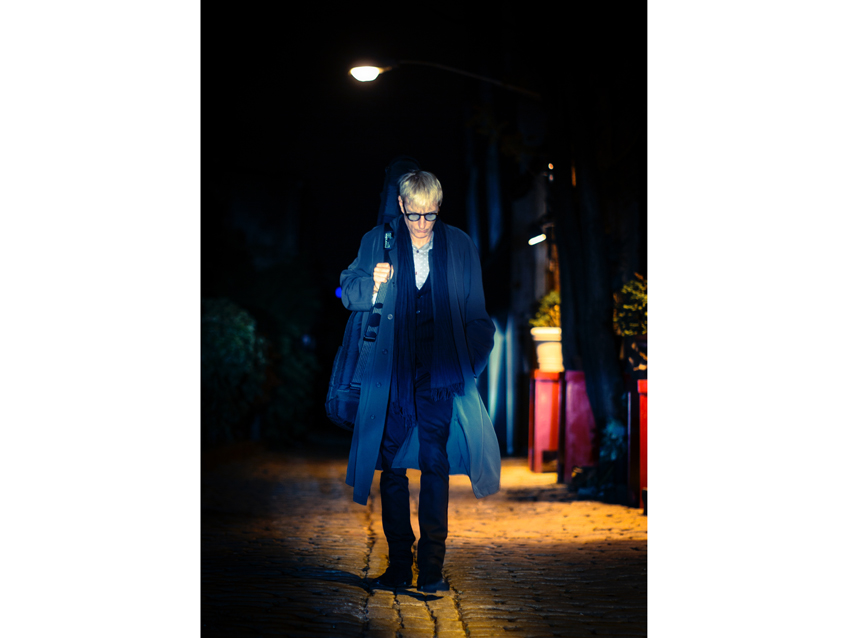
Will Lee's top 5 tips for bassists
"The worst thing you can do as a musician is to allow yourself to become stagnant," says bassist Will Lee, a man who, it would seem, couldn't fit navel-gazing into his schedule even if he tried. Since 1982, he's been a mainstay alongside bandleader Paul Shaffer on David Letterman's late-night TV shows. It's a gig that has afforded him the opportunity to perform with an untold number of guest artists, but one that has required him to learn, day by day (and sometimes on half a day's notice), songs that run the gamut from jazz standards to heavy metal.
During this time, Lee's dance card has also been booked solid as one of New York City's first-call session bassists and vocalists. And if that weren't enough, for the past 16 years he's been a member of what must surely be the world's most note-perfect Beatles tribute band, The Fab Faux. Vacation time doesn't seem to exist for Lee, who, on the day before speaking with MusicRadar, returned from a quick trip to Japan, where he performed with the noted pop and jazz musician Akiki Yano.
"Every gig you play and everybody you jam with can offer you something new."
"I did a funny thing: I volunteered to pick up synth bass on the keyboard to play with her," Lee says. "She just put out an album that’s got a lot of electronica stuff on it. I told her, ‘Sure, I could play what you’ve got on electric bass, but I’ll volunteer to get my keyboard chops together just so I can make your stuff sound great.’ She jumped on it, and of course, then I said, ‘Oh, great. Now I’m screwed!’ [Laughs] But that’s what you’ve gotta do – just dive in." He pauses, then adds, “Besides, I like scary. When the learning stops, that’s when you really should get scared."
Key to Lee's success, beyond his obvious, all-around chops and an irrepressible, engaging spirit, is a musical curiosity that, he says, deepens with each artist he plays with. "Every gig you play and everybody you jam with can offer you something new," he says. “If you keep your ears open, and if you stay hungry, you’re going to pick stuff up. New skills go into your playing arsenal – you don’t know when you might use them, but they’re good to have. Always be receptive to new ideas. The minute you say, ‘Oh, I don’t wanna know about that,’ well, you might be missing out on some important shit."
On the following pages, Lee offers his Top 5 Tops for Bassists, with the preface that “you never truly master the bass, and even when you think you might have, that’s when you go back and listen to the real masters." In addition to his nightly appearances on the Late Show With David Letterman, Lee can be seen this fall performing with the Fab Faux – click here for dates.
All photos courtesy of Sandrine Lee. Visit her official website here.
NEXT: Listen, listen, listen

Listen, listen, listen
“Listen to all the stuff that appeals to you and piques your interest, and then sit down and take the time to figure it out. If you’re digging something, try to play it yourself. It starts with your ears before it works its way to the fingers. It might be hard at first, but eventually the process will become fun, especially when you nail whatever it was that might have seemed tricky at first.
“And a big part of ‘listen, listen, listen’ is to always keep your ears open when you’re playing with other musicians and singers. Don’t just focus on your part and what you’re doing, but key in to what’s going on with the music around you. It’s almost like you have a producer’s hat on and you’re looking down at the band and the overall picture – even if you’re in the band.”
NEXT: Keep a career in mind

Keep a career in mind
“Unless you’re already well-to-do and are just doing this for a hobby, you might not need this advice. But it’s good to think, ‘Hey, I might be able to make money at this. I might be able to make this a career.’ As a bass player, you have a purpose beyond soloing, and if you want to get hired and get paid and be a real part of this business, you have to learn how to be a section player.
“Your part isn’t the only thing that’s happening in the music; you’re part of a rhythm machine in which there are gears interconnecting with each other. Learn how to be supportive and when to stay out of the way.
“This will be important to you in your career as you go on. Be helpful to the music, be helpful to the other musicians. If you can do that, you’ll have a good shot at actually having a career as a bass player.”
NEXT: Stay versatile

Stay versatile
“If you have a big vocabulary and you listen to a lot of stuff, you can bring all kinds of fresh information to the music you’re playing. And this is especially true if you have a big vocabulary of stuff that’s outside of the genre you’re currently in.
“I remember one time I was playing with George Clinton on the Letterman show. I came up with a country kind of lick, or maybe it was a reggae thing, and I asked George, ‘Hey, does this work?’ And he said, ‘Everything works in funk.’ But the great thing was that I brought in something unexpected to what he was doing.
“The blues is another great example. If you bring some fresh information to the blues, people will think you’re a genius. The music will take on a whole new dimension.
“The only time this doesn’t work is when I’m playing with the Fab Faux. Then it’s a cardinal sin. ‘What was that? That’s not on the record!’” [Laughs]
NEXT: Don't be a loner

Don't be a loner
It’s important to hang out in whatever scene you wanna be a part of. Go out and meet people. See the bands that are playing. Make connections. And don’t just meet people, but get inspired by their playing. One day, they might get inspired by you.
“Make connections. I know as musicians we can sometimes be awkward and shy people. That’s why some of us play music in the first place, to overcome our shyness. But once you make a decision to pursue music, you have to get out there and make it happen.
“Some form of business card is not a bad thing. Whether it’s paper or a V-card with which you can share your contact info, be ready with it. Don’t waste people’s time fumbling around – ‘Oh, man, I don’t have a card. Hey, do you have a pen? Lemme write something down on a napkin somewhere.’ It takes you two minutes to make a V-card, so do it.”
NEXT: Be prepared

Be prepared
“A lot could be said for this one. In the world that I appear in, which is outside of my home, being with my friends, peers and the public, nobody but my wife ever really sees me work. Those other people have only seen me ‘play,’ never work.
“That’s because I spend my private hours doing my homework and preparing. In the business that we’re in, it’s really important to be ready at all times. You don’t want to hang people up while they wait on you to work your shit out. It’s other people’s time and money going down the drain while you figure out what you should have worked on last night.
“So whatever level you’re at, whether you’re in a basement band with your buddies or if you’re doing some sort of pro gig, always be prepped and ready for whatever the plan is. You’ll improve the music, and you’ll get more results out of everybody else. And people won’t think you’re a jerk – that pretty important.”